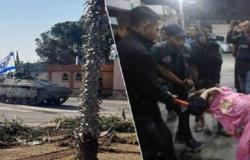16:57
‘US will not yet impose sanctions on controversial Israeli battalion’
The controversial Israeli Netzah Yehuda battalion does not yet have to fear American sanctions. US Secretary of State Antony Blinken wrote this to Speaker Mike Johnson of the US House of Representatives, ABC News reports. Blinken first wants to wait and see whether Israel itself cleans up the battalion, which is allegedly involved in human rights violations.
Last week, American media reported that the US planned to punish the Netzah Yehuda battalion. That battalion consists of extremist settlers and ultra-Orthodox Jews and is mainly active in the occupied West Bank. They are allegedly involved in abuse and torture of Palestinians. The Israeli army would ignore that. The unit is heavily over-represented in sanctions imposed by the Israeli army itself for crimes against Palestinians.
If the battalion were sanctioned, it would no longer be allowed to use American weapons. Members would also no longer be allowed to receive training from the US. While Blinken acknowledges that the unit is indeed involved in human rights abuses, Blinken expects Israel to punish the unit itself: “The Israeli government has presented new information about the unit and we will discuss a way to effectively remediate the unit.”
Joram Bolle
Also read about the Netzah Yehuda Battalion: The US wants to intervene in the infamous Israeli battalion, which follows its own rules with impunity
2:55 PM
UN official: Gaza could take 14 years to be free of rubble and unexploded bombs
It could take fourteen years to clear the Gaza Strip of rubble and unexploded bombs. Pehr Lodhammar, chief officer of the UN mine countermeasures agency (Unmas), said this during a briefing in Geneva, Switzerland. It is estimated that there are about 37 million tons of debris in the hard-hit area.
The enormous trails of destruction left by the war in Gaza became visible earlier this month in southern Gaza. After the Israeli army had largely withdrawn from this part of the area, the first displaced persons returned to the town of Khan Younis. What they found was a city in ruins.
Researchers from the American University of New York and Oregon saw on satellite images that as many as 55 percent of the buildings in Khan Younis have been destroyed or damaged. In the north of Gaza the figure is as high as 70 percent, while in the south of Rafah – where a large-scale attack is imminent – a third of the buildings are no longer standing.
On top of that are the unexploded explosives. “We know that normally at least 10 percent of land munitions fired do not work,” Unmas’s Lodhammar said. ‘We are talking about fourteen years of work with a hundred trucks.’
Jasper Daams
14:14
Student protest in the US against war in Gaza spreads to fifty universities
The protests by American students against the war in Gaza are spreading like wildfire across the US. The police have already made more than 400 arrests at twelve universities in recent days.
You can read the full article here.
12:07
Mayors speak out against advancing anti-Semitism
329 of the 342 mayors in the Netherlands have spoken out in an open letter against rising anti-Semitism. In the letter, which the municipality of Amsterdam published on their behalf today, the mayors call for continued resistance ‘against any form of discrimination and racism’.
Thirteen mayors did not sign the letter. This also applies to Mayor Carla Breuer of Teylingen. According to a spokesperson for the municipality, Breuer does support the message, and her own message is 99 percent the same. “But this is a little more in her own words.” It is not clear why the other twelve did not put their names under the letter.
Anti-Semitism is not an incident, the letter writers say, ‘but an age-old form of racism that, if we do nothing, will be passed on from generation to generation’. According to the mayors, anti-Semitism never went away after the Second World War, but anti-Semitic incidents increased after October 7, 2023.
The mayors also say they are ‘horrified’ by the ‘gigantic numbers of civilian deaths in Gaza’ caused by Israel. They emphasize that criticism of the Israeli government cannot be classified as anti-Semitism. “But holding Jewish people responsible for the actions of that government, just because they are Jewish, is.”
It characterizes the difficult position in which the mayors find themselves. Earlier this week they were called upon to wear an orange yarmulke on King’s Day. The initiators emphatically call it ‘not a political position’, but it seems that many mayors understand it that way and will not heed the call. Spokespeople for four major cities have already announced that their mayors will not wear the yarmulke tomorrow.
Jasper Daams
Read Haro Kraak’s analysis here about how activists use King’s Day to make a statement: Wear an orange yarmulke or go to the ‘fossil-free market’: is King’s Day hijacked by activism?
11:34
Hezbollah kills Israeli civilian in attack on military convoy
Hezbollah attacked an Israeli military convoy around the Lebanese border shortly before midnight, the militant group and the Israeli army said. Hezbollah killed an Israeli citizen who was traveling with the convoy to carry out infrastructure work. Hezbollah militants are said to have ambushed the convoy. They destroyed two vehicles.
Since the terrorist attack by Hamas on October 7, 2023, a second front has emerged on the border between Lebanon and Israel, where both sides are constantly firing at each other. This regularly results in civilian casualties. Tens of thousands of people on both sides of the border have been displaced.
The Israeli army has been carrying out targeted attacks on high-ranking Hezbollah militants for months. On Wednesday, Israeli Defense Minister Yoav Gallant said the military had eliminated more than half of the group’s officers. Hezbollah denies that claim.
After the overnight attack, the Israeli army said it struck several Hezbollah targets in the eastern village of Shebaa, including an arms depot and a rocket launcher.
Jasper Daams
Read Jenne Jan Holtland’s report here, about the victims of the war on the Israeli-Lebanese border: In Lebanon, the dormant war between Hezbollah and Israel claims new victims every day.
07:02
Israeli media: Israel would accept release of fewer hostages
According to Israeli media, Israel is prepared to abandon Hamas’ original demand for the release of forty hostages in exchange for a temporary ceasefire. Israel would be willing to accept the release of 20 hostages as long as they are women, men over 50 and the seriously ill.
The War Cabinet has instructed the Israeli team of negotiators to discuss this with an Egyptian delegation arriving in Tel Aviv on Friday, Israeli media reports said.
The Times of Israel reports that Israel would be willing to do this after Hamas rejected an earlier proposal that included the release of forty hostages. Hamas claimed it did not have that many hostages in those categories still alive.
A senior Israeli official has denied that 20 hostages were involved. According to him, this would involve 33 hostages, the number of female, senior and sick people still being held in Gaza. According to Hamas, that number is closer to twenty The Times of Israel. (AP)
00:00, Yesterday
Welcome to the live blog of Friday April 26
This was the most important news about the crisis in the Middle East on Thursday, April 25:
• The entire Gazan population of 2.2 million people has experienced acute food insecurity last year since the escalation in October. The United Nations reports this through the Global Report on Food Crises. According to the report’s authors, this is the largest share of a population in the history of the IPC classification system, which has been used to assess food security for more than ten years.
• The White House demands a ‘thorough and transparent’ investigation into the mass graves found in the Gaza Strip. The United Nations expressed a similar need two days ago. Last week, Palestinian aid workers found a mass grave inside the Nasser Hospital complex in the southern city of Khan Younis.
• Eighteen countries with civilians held hostage in the Gaza Strip have called on Hamas to release them. This concerns Argentina, Brazil, Bulgaria, Canada, Colombia, Denmark, France, Germany, Hungary, Austria, Poland, Portugal, Romania, Serbia, Spain, Thailand, the United Kingdom and the United States. The statement comes a day after Hamas released a video of American-Israeli hostage Hersh Goldberg-Polin.
Read Thursday’s full live blog here.







